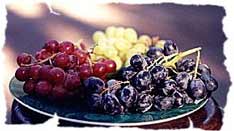January Newsletter 2000
The Orchard Home Grown
Grapes
 The grapes are forming well on the vines with the first bunches being picked around New Year. The Carolina Blake Rose is looking excellent and carrying a heavy crop with large grapes. Although not seedless, (very few seedless grapes are suited to the high humidity in coastal subtropical areas), they have very few seeds and a high flesh to seed ratio. If we relatively dry weather from now until January they will be very sweet and crisp. As a backyard grape Carolina Black Rose comes highly recommended.
The grapes are forming well on the vines with the first bunches being picked around New Year. The Carolina Blake Rose is looking excellent and carrying a heavy crop with large grapes. Although not seedless, (very few seedless grapes are suited to the high humidity in coastal subtropical areas), they have very few seeds and a high flesh to seed ratio. If we relatively dry weather from now until January they will be very sweet and crisp. As a backyard grape Carolina Black Rose comes highly recommended.
Summer Gardening
In the heat of summer it appears that our gardens are better suited to tropical plants and cactus. Most plants are now showing signs of heat stress, however there are ways to effectively keep your garden looking fresh.
The best way is to conserve soil moisture that is to insulate your soil from the sun's rays with a layer of mulch or compost. The mulch soaks up irrigation water to prevent it from running off of your garden while while also protecting the soil from releasing water to the atmosphere through evaporation. It is the evaporation from the soil that makes our plants so susceptible to the summer heat. If bare soil is allowed to bake in the sun it can result in a "crusting" of the surface minimising the absorption of water. The repelling of water can be devastating to your garden causing plants to stress each during the warmest part of the day. If wilting occurs due to the heat, tissue damage is done, and each time this occurs the plants become weaker and more susceptible to further problems.
If plants have suffered heat stress they emit chemicals that attract pests which brings about insect and disease problems. Weak plants are far more susceptible to insect infestations and disease.
The benefits of mulch are many as it keeps valuable plant nutrients in your garden where they belong and conserves and makes more efficient use of your irrigation water by preventing runoff. And that's not all, mulch placed on your soil regularly also builds the overall quality of your soil and feeds the billions of beneficial microorganisms that help to increase humus formation that in turn feeds the earthworms.
 Wampee - is a subtropical to tropical plant native and commonly cultivated in southern China and the northern part of former French Indochina, especially from North to Central Vietnam. It is cultivated to a limited extent in Queensland, Australia.
Wampee - is a subtropical to tropical plant native and commonly cultivated in southern China and the northern part of former French Indochina, especially from North to Central Vietnam. It is cultivated to a limited extent in Queensland, Australia.
The fruits on 0.6-1.25 cm stalks, hang in showy, loose clusters of several strands. The wampee may be round, or conical-oblong, up to 2.5 cm long. Thin, pliable but tough rind is light brownish-yellow, minutely hairy and dotted with tiny, raised, brown oil glands. It is easily peeled and too resinous to be eaten. The flesh, faintly divided into 5 segments, is yellowish-white or colourless, grapelike, mucilaginous, juicy, pleasantly sweet, subacid, or sour. The fruits ripen in in November and December in Queensland. Seedlings begin to bear when 5 to 8 years of age or sometimes older. Mature trees may yield 45 kg of fruits in a season.
A fully ripe wampee is delicious eaten out-of-hand or the pulp can be added to fruit cups or desserts, or made into pie or jam.
Citrus Trees
As mentioned in last months newsletter we gave gardeners far warning that insects such as Citrus Leafminer will soon be visiting their citrus trees. Below is an excellent site with FAQ's regarding Citrus. Although a Florida site it gives good information on insect and disease problems associated with citrus.
http://www.marioncountyfl.org/coopext/mastergardener/springfaqc.htm
Xmas Activities for Children in the Garden
Listed are three sites that will help you to keep those "Little Sprouts" occupied in the garden throughout the Christmas holidays. The sites are full of fun practical ideas that will encourage your children's interest.





